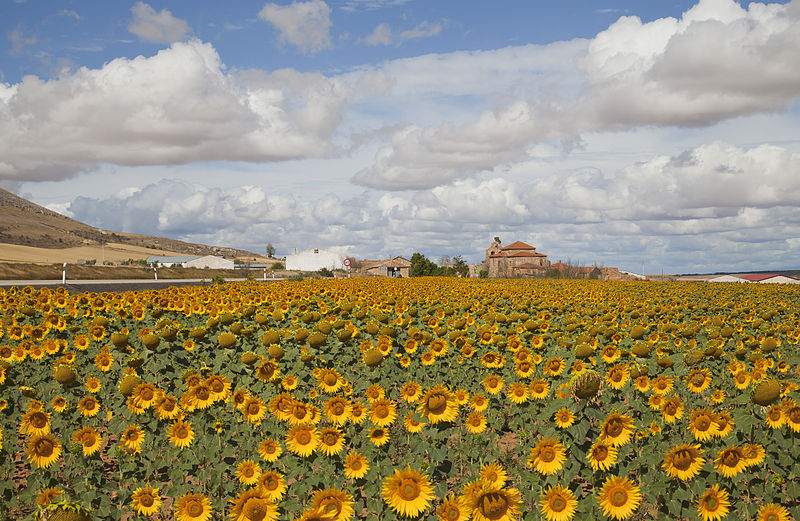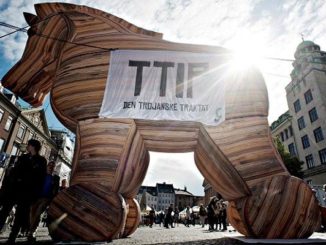
Romanian and Bulgarian agricultural workers endure appalling conditions in the west. New, hard right populist political parties demonise them yet western workers won’t do these backbreaking jobs anyway. its a loose loose situation for the migrant worker, and it needs to change.Mathilde Archambault and Louise Desmazieres of Eco Ruralis reports.
It is not news that the CAP has supported the creation of big industrial farms. If these farms chased away a number of permanent jobs they also became a massive supplier of unstable jobs through seasonal work for the harvest, especially in fruit picking.
These thankless jobs are often done in Western Europe by workers who come from Eastern Europe. Recently, a British political party, UKIP, launched a campaign leading up to the European elections which was directed against Romanians and Bulgarians who come to England to work. The general European agenda is more and more about keeping jobs in each country for domestic workers.
But what kind of jobs are we talking about? In the agricultural sector at least, many people are unsure whether Western Europeans would like to actually do these jobs.
Many Romanian people from the countryside have worked abroad for at least a few months in their lives, as agricultural seasonal workers. They go to Western European countries such as Spain, Portugal, England or Germany. Indeed, salaries there are much higher than in Romania. In fact, Romania’s minimum salary is 157.5 €/month -one of the lowest in the EU- whereas it is 753 €/month in Spain and reaches 1,264 €/month in the UK. The migrants often mention that their reason for leaving Romania is to have an experience abroad, gain more money or have the possibility to build their life there.
Romanians deciding to do agricultural work abroad often focus on young people and women. Many don’t even speak the language of the country they are going to, which makes them more vulnerable to unfair working and living conditions.
Until January 1st of 2014, England had a special scheme (SAWS, Seasonal Agricultural Workers Scheme) for workers from Romania and Bulgaria (called “A workers”) coming to work in horticulture and agriculture for the season (3-6 months). According to this scheme, 21,250 workers were allowed to come to the UK every year to work on the farms, in the horticulture sector or in the food processing sector. More generally, the British Minister of State for Immigration reported that in 2013 one third of the seasonal workers in agriculture were coming from Romania and Bulgaria. The British government didn’t renew SAWS last January arguing the fact that there are enough unemployed people to meet the needs of the seasonal agricultural sector. That means that now, the agricultural sector is not considered different than the other employment sectors. Romanian agricultural workers are still allowed to come to the UK though, and no important change is foreseen for the years ahead.
But the UK is not the only country that attracts Romanian workers for seasonal contracts. Indeed, most of the time, seasonal workers who are employed through contracts on a day to day basis in huge industrial farms in Romania are likely to be unemployed after the picking period (from spring till the end of summer). Then, they have to find another way to provide for their needs. Southern European countries like Portugal, with Autumn/Winter harvest seasons, are where workers end up.
Alentejo region, in the south of Portugal, offers a landscape of wheat and sunflower fields but also vineyards and mostly olive plantations. For olives harvests require loads of labor and can last from September until February.
Using the instability of Romanian seasonal workers and the necessity of labor forces in Portuguese fields, some companies such as Agilremo Unipessoal, Ld.ª and Marius Dobritoiu – Serviços Agrícolas Unipessoal, Ld.ª organized for migrant labour to travel from Romania to Portugal. Those companies are acting as a contracting entity for Portuguese farms. They are registered in Portugal but managed by Romanians. They recruit Romanian workers, promising them free transport to Portugal, a 30€/day pay for 8 hours of work and housing.
Portuguese basics rights for seasonal workers mean that each seasonal worker should receive vacation and holiday pay, a Christmas bonus and compensation proportional to the duration of contracts, as well as social welfare, an accident work insurance and medical examination. Also, travel to and from the workplace should be taken care of by the employer. it is alleged by Trade Unions in Portugal, however, that this rarely happens.
Even worse, once they arrive in Portugal, identity documents are often taken and held by the manager in charge and workers are not given permission to access them. The Portuguese Authority for Working Conditions (ACT) and some workers’ testimony also report terrible living conditions, with more than 12h of work/day, with really few breaks and insufficient water available. Houses are often overcrowded with 10 mattresses on the ground and only one bathroom for more than 20 people. Finally, the salary (when they actually receive it) is lower than the Portuguese minimum pay for agricultural work. These abuses are being ignored by these farms which are being enabled by the current competition among EU countries in the agricultural sector.
Even if it doesn’t seem to reach this point in the UK, in a report assessing the consequences of the closure of SAWS, one can read that “British workers either cannot or will not work at the intensity required to earn the agricultural minimum wage.” This clearly means that working conditions that are not acceptable for a westerner can or should be acceptable for a Romanian or Bulgarian worker.
So, instead of blaming migrants for stealing seasonal jobs in agriculture, maybe energy should be put into finding a way not to have this kind of precarious employment – for both migrants and domestic workers. The greening of the CAP introduces cross compliance with environmental criteria for the first pillar, but the aid should also be conditioned to respect labor laws and good working conditions on farms. And let’s not forget that the easiest way to limit unstable jobs is to help and support smallholders, and to recognize their economic and social importance in rural areas.
More
La Via Campesina on how to improve the rights of the seasonal workers in agriculture.
-
The establishment of a specific aid to small farms, recognizing their economic, social and territorial functions.
-
The installation, within the framework of the Common Agricultural policy, of the conditionality of aids related to the respect of labour laws.
-
The prohibition of States to help or subsidize farmers who do not respect their obligations as employers.
-
The creation of an observatory through the common agricultural policy to monitor the working conditions of seasonal workers
-
The signature, ratification and application by all European countries of the International covenant on migrant workers.
-
The signature, ratification and application by all European countries of International convention 184 on health and safety in agriculture of the International Labour organization.
- The regularization of the undocumented agricultural workers and the application on universal rights in the whole of Europe.
More by the Eco Ruralis team
- Moldova: East or West, Capitalism Defines its Socio-Economic Terrain
- Will Dacian Cioloş remain as Agriculture Commissioner?
- Want to volunteer on peasant farms? Try WWOOF Romania!
- Pioneer’s GM maize 1507: a case history
- Grown men working 12 hours a day for a loaf of bread
- Romanian alternative food networks: growing through the cracks
- Victory for Romanian peasants over gold mining corporation
- Food Sovereignty: an idea whose time has come.
- Public Land Agencies: French SAFER model safe for Romania?
- Elections 2014 in Romania
- New open source database uncovers land grabbers
- Organic Participatory Guarantee Systems – a Brazilian model.
- Let there be biodiversity! The importance of sharing free seeds
- FAO Voluntary Guidelines – hope for responsible land tenure policies
- Food losses and waste on the FAO agenda in Bucharest
- Organic vs. Conventional agriculture – where’s the profit?
- FAO Conference: peasant rights on the table!
- Ukraine’s land struggle with Russia
- The irony of national markets: cheap exports expensive imports




